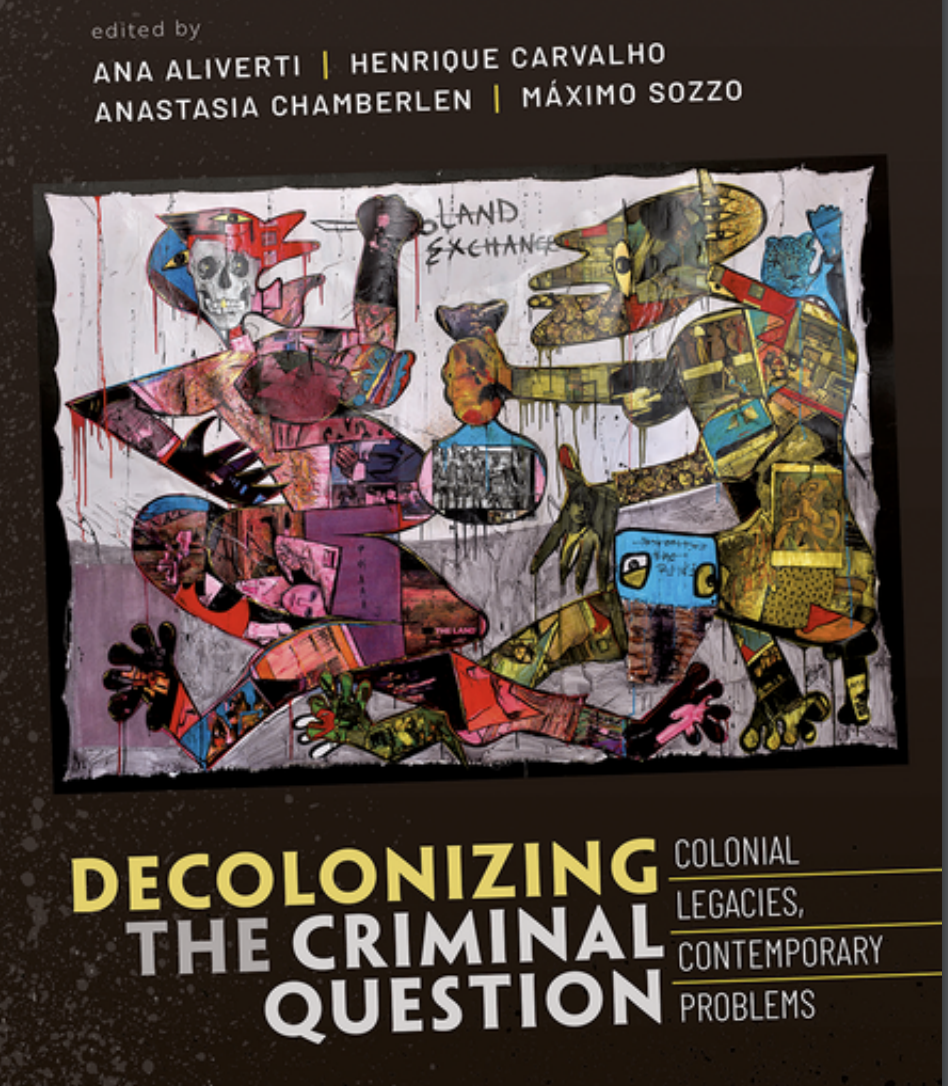Peer Reviewed Articles
Khan, OP (2023) The Coloniality of Justice: Naturalized Divisions During Pre-Trial Hearings in Brazil in Decolonizing the Criminal Question: Colonial Legacies, Contemporary Problems
Abstract
Custody hearings were introduced in Brazil in 2015 with the hope that prompt in-person presentation of detainees before a judge, rather than merely a police report, would de- crease the excessive use of pre-trial detention. However, the use of pre-trial detention remains high, especially for young Black men with low to no income. This chapter con- tributes to the literature by highlighting the coloniality of justice as manifested within judicial decision-making at the pre-trial stage in Brazil. Analysis of twenty-six interviews with judges, prosecutors, public defenders, and specialists in Rio de Janeiro reveals the divergent treatment accorded to those on either side of the dichotomous notions of the bandido (criminal) and the cidadão de bem (the good citizen). A thematic framework analysis leads to a discussion of the white-centred nature of citizenship and justice and how stigmatized spaces are considered criminogenic. The chapter traces how colonial white-supremacist logic has persisted in naturalizing inhumane treatment of racialized groups in the collective consciousness of the gatekeepers of justice in Brazil.
Darke, S. and Khan O.P. (2021) Coloniality, Just War & Carceral Injustice in Brazil. Punishment & Society. 23(5): 723-740 (Special edition: Legacies of Empire)
Abstract
The Portuguese empire brought inescapable violence to the indigenous communities of Brazil and to those it enslaved. Throughout the centuries of colonial subjugation, driven by the Iberian monarchical traditions of hierarchy, militarism and moral crusade, ‘just war’ narratives were employed to legitimate the use of violent legal and extra-legal measures against enslaved peoples and others deemed unruly or rebellious and a threat to colonial order. Two centuries after independence, Brazil remains at war with its ‘internal enemies’. Its justice practices continue to be characterised by colonial rationalisations. This paper illustrates the contemporary coloniality inherent in the carceral system from the moment of detention pre-trial through sentencing and imprisonment.
OP Khan (2021) Made by men for men? In search of a gender responsive approach to men in prison. Prison Service Journal 257
In this paper, I examine the current situation of a gender responsive approach to the male prison estate. In no way do I intend to draw attention away from the vital work of a gender responsive approach to working with women and girls in places of detention. What I advocate for here is for those in policy positions to consider how the male prison estate (and the justice system more broadly) could benefit from applying similar progressive thinking to that which has developed gender-informed processes with women in prison. Prison systems almost exclusively operationalise a binary approach to gender; however, a complete gender responsive approach would also account for a greater understanding of those who identify as transgender, gender fluid and gender non-binary. In 2016 the UK government introduced a new policy stating that prisons must also recognise those with fluid and non-binary genders and other governments have officially acknowledged three genders. While this article focuses on people who were born male and identify as men, I believe that a greater understanding of gendered expectations, pressures and realities can contribute towards facilitating a less binary approach to gender.
Brazilian favelas are known as spaces of criminal enterprise, of poor to non-existent infrastructure and extreme violence. They are places of informal industry conducted by unregistered workers, living in unofficial settlements, beyond the boundaries of sanctioned society. But favelas are also spaces of class solidarity, close-knit convivial communities and hardworking people existing within an area where the state does not have a monopoly on violence. Unprotected by conventional social contract, residents of favelas are regularly victims of state violence, with officers routinely conducting raids, torture and extrajudicial killings… Read in Full
Abstract
This paper evaluates a pioneering project to introduce a gender-sensitive approach to working with women completing probation and community service orders in Kenya. The intervention consisted of context-specific research with women throughout Kenya, leading to adaptations to existing probation tools, followed by pilot implementation of a gender-sensitive approach. The evaluation explores the relevance, effectiveness and sustainability of the intervention and presents opinions of implementing probation officers and sector experts. Findings suggest that the project genuinely broke new ground in terms of research on gender-sensitivity and quality of pre-trial reporting for women. Close adherence to the UN Bangkok Rules means the model and lessons are applicable both domestically and globally.
Professional Reports
As part of a Gender & Security Toolkit Coordinated by ODIHR, DCAF and UN Women, Omar wrote the guidance document on places of deprivation of liberty and gender.
The tool sets out in more detail why it is important to integrate a gender perspective into policies and practices concerning places of deprivation of liberty, covering key definitions related to the topic, including a discussion on non-binary understanding of gender and the importance of understanding intersectionality
A comprehensive evaluation of Penal Reform International's pioneering , multifaceted project, focusing on the experiences of women completing non-custodial sentences, specifically Community Service Orders and Probation Orders in Kenya and the investigation of how to best adopt a gender-sensitive approach.
The evaluation consisted of both desk and field-based research, including interviews with a number of stakeholders in two pilot regions of Kenya. The resources created and interventions made during the project were assessed for Relevance, Effectiveness and Sustainability and recommendations were made for both institutionalising gender-sensitivity in the Kenyan system and for applying learning to international contexts.
ConferenceS & Presentations
British Society of Criminology Annual Conference 2021
Omar presented on a forthcoming paper “Naturalisation of the Anti-Citizen: The coloniality of justice and pre-trial judicial decision making in Brazil. The conference was hosted by the Open University.
Punishment in the Global Peripheries
The workshop was hosted by the University of Oxford Centre for Criminology 23-25th June 2021
Omar presented a forthcoming coauthored article with Dr Sacha Darke on ‘Legacies of Empire: Coloniality, Just War & Carceral Injustice in Brazil’
SECOND INTERNATIONAL CONGRESS ON CONFLICT, POWER AND JUSTICE IN THE GLOBAL SOUTH
The conference was hosted by the Catholic University of Colombia in Bogotá, Colombia on November 6th-9th 2019 and jointly organised by QUT Centre for Justice. It focused on criminological perspectives from the global south and aimed to contribute to the task of democratising and building a knowledge of the global South. Omar presented his paper titled:
HUMAN RIGHTS FOR RIGHTEOUS HUMANS? A decolonial examination of the utility of the application of normative human rights discourse to criminal justice contexts in Brazil.
VIII OXBRIDGE CONFERENCE ON BRAZILIAN STUDIES
Omar presented on his PhD thesis work related to multiple interpretations of human rights as related to justice contexts in Brazil. The annual conference was held at the University of Cambridge, UK.
University of Westminster Annual Social Sciences Conference 2019
Omar presented on his PhD thesis work related to geopolitics of knowledge.
ROUNDTABLE DISCUSSION ON THE 2030 SUSTAINABLE DEVELOPMENT AGENDA AND PRETRIAL DETENTION
The Commonwealth Human Rights Initiative, Open Society Foundation and UNODC held a round table discussion in London to discuss Sustainable Development Goal (SDG) 16.3: Promote the rule of law at the national and international levels and ensure equal access to justice for all. Omar presented his previous work on reducing pre-trial detention in East Africa and took part in discussions related measuring progress against the current indicator and possible improvements to future measurement.
ICPA CONFERENCE LONDON 2017
Omar hosted the panel discussion on Global Prison Trends at the recent ICPA Conference 2017 on Innovation in Rehabilitation: Building Better Futures.
BRITISH SOCIETY OF CRIMINOLOGY ANNUAL CONFERENCE
Omar was selected to present at the British Society of Criminology Annual Conference 2017. The topic was his evaluation of a gender-sensitive approach to probation in Kenya. You can find more information here.
UNODC 26TH SESSION OF THE COMMISSION ON CRIME PREVENTION & CRIMINAL JUSTICE
Omar attended the United Nations Office fro Drugs and Crime 26th Session of the Commission on Crime Prevention and Criminal Justice in Vienna, to talk about a gender-sensitive approach to Probation and Community Service
EXPERT GROUP MEETING TO DISCUSS THE IMPLEMENTATION OF THE NEWLY ADOPTED NELSON MANDELA RULES
On 7-8 April 2016, PRI and the University of Essex Human Rights Centre hosted a meeting of criminal justice experts to review the revised UN Standard Minimum Rules for the Treatment of Prisoners, adopted as the Nelson Mandela Rules in December 2015. Legal, policy and operational issues were identified that may arise for prison administrations in interpreting and applying the revised Rules.
6TH UNITED NATIONS INTERNATIONAL CORRECTIONS IN PEACEKEEPING CONFERENCE
ZAMBIAN GOVERNMENT & UNITED NATIONS: The two-and a-half day event was held on the theme “Strengthening Public Safety, Peace and Security in Post-Conflict Settings” and is expected to brought together about 120 corrections experts comprising practitioners and partners from the United Nations system, other international organisations, heads and representatives of national prisons services, including from post-conflict countries.
21ST COUNCIL OF EUROPE CONFERENCE OF DIRECTORS OF PRISON AND PROBATION SERVICES
CONFEDERATION OF EUROPEAN PROBATION: The theme of the Conference was Community Involvement in Prison and Probation Work. Discussions included:
The role and place of families of offenders and the attention and care needed by their children
Examples of co-operation between prison and probation services and the community as a way towards better social reintegration of prisoners and probationers
Prison overcrowding
Ways of dealing with radicalisation of prisoners.
The event also included working group discussions on amending the Draft Recommendation on the European Rules on community sanctions and measures and a visit to the new judicial complex Zaanstad was also organised by the Dutch Custodial Institutions Agency.
SECOND WORLD CONGRESS ON COMMUNITY CORRECTIONS
INTERNATIONAL COMMUNITY CORRECTIONS ASSOCIATION: Presented provisional results of PRI's alternatives to imprisonment project focusing on improving access to community service across East Africa, to an international audience, followed by questions and discussion.
IMPLEMENTATION OF THE NELSON MANDELA RULES IN AN AFRICAN CONTEXT
UGANDAN PRISON SERVICE & SPECIAL RAPPORTEUR ON PRISONS & CONDITIONS OF DETENTION
Meeting of Ugandan officials to discuss the implementation of the new UN Standard Minimum Rules for the Treatment of Prisoners. The meeting was chaired by the Special Rapporteur on Prisons and Conditions of Detention in Africa, Commissioner Med S.K. Kaggwa. The day-long event explored the changes to the Rules, in particular how they can be put into practice and some of the challenges in the Ugandan and wider African contexts.
Module Leader:
5CRIM002W Globalisation, Crime and Control
6CRIM003 Punishment and Society
Other Teaching
4CRIM002W Justice and Human Rights
4CRIM003W Controversies in Criminal Justice
5CRIM003W Race, Crime and Justice
5CRM004W Gender, Crime and Justice
BA Dissertations
7PIRS022W Postcolonial International Relations: Theories and Concepts


















